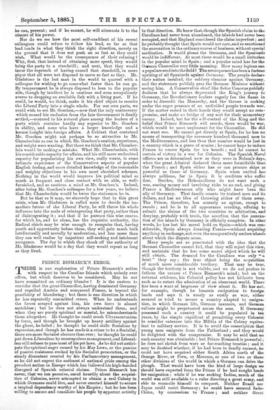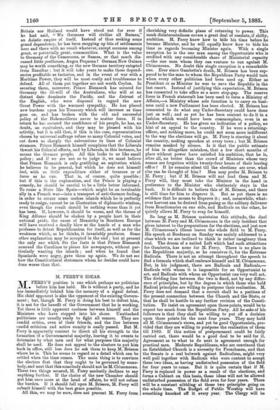PRINCE BISMARCK'S ERROR.
THERE is one explanation of Prince Bismarck's action with respect to the Caroline Islands which nobody ever -offers, but which deserves to be considered. May he not have committed an ordinary blunder ? It is the custom to consider that the great, Chancellor, having dominated Germany and expelled Austria and conquered France, is beyond the possibility of blundering ; but there is one direction in which he has repeatedly committed errors. When he understands the forces arrayed against him, his own force is almost matchless ; but he does not always understand them, and when they are purely spiritual or mental, he misunderstands them altogether. He thought he could crush Ultramontanism by force, and though he brought up heavy artillery against the ghost, he failed ; he thought he could stifle Socialism by repression, and though he has made it a crime to be a Socialist, there are more Socialist electors than ever; he thought he could put down Liberalism by unscrupulous management, and Liberal- ism still refuses to pass most erf his pet laws. As he did not antici- pate the spiritual anger caused by his May Laws, or the passion of passive resistance evoked by his Socialist persecution, -or the steady discontent created by his Parliamentary management, so he did not expect the ontbunst of .national pride among the proudest nation in Europe which has followed his high-handed disregard of Spanish colonial claims. Prince Bismarck has never, that we can perceive, cared heartily about the acquisi- tion of Colonies, never attempted to obtain a real Colony in which Germans could live, and never exerted himself toeecure a tropical dependency -worthy of his Empire ; but he has been willing to.amuse-and conciliate his people by apparent activity
in that direction. He knew that, though the Spanish claim to the Carolines had never been abandoned, the islands had never been occupied, and that England considered the claim imperfect ; and
he probably thought that Spain would not care, and so sanctioned the annexation in the ordinary course of business, without special
meditation. It would please the Germans, and the Spaniards would be indifferent. At most there would be a small irritation in the popular mind in Spain ; and a popular mind has for the Gorman Chancellor very little meaning. How many legions can a populace send into the field? The consequence has been a f urioas uprising of all Spaniards against Germany. The people declare their nation insulted, the soldiery clamour against Germany, and the statesmen publicly pass the German Minister without seeing him. A Conservative chief like Senor Canovas publicly declares that he always deprecated the King's journey to Germany, the Revolutionary leaders eagerly fan the flame in order to discredit the Monarchy, and the throne is rocking under the eager pressure of an undivided people towards war.
If the matter rested in their hands they would accept no com- promise, and make no bridge of any sort for their momentary enemy. Indeed, but for the self-control of the King and the belief that Prince Bismarck will recede, there would be war, which would be most unpleasant for the Chancellor. He did not want one. He cannot get directly at Spain, for he has no means of transporting the necessary hundred thousand men to the Mediterranean, and less than that number would be lost -in a country which is a grave of armies ; he cannot hope to induce France to coerce Spain for his benefit ; and he cannot be certain of victory in a war for Colonies. The Spanish Naval officers are as determined now as they were in Nelson's days, when the great Admiral declared them more formidable than the French ; and Spain either has or can procure ships as powerful as those of Germany. Spain when excited has always millions, for in Spain it is creditors who suffer first. Besides, the Hohenzollerns do not want such a war, costing money and involving risks to no end, and giving France a Mediterranean ally who might have been the ally of Germany. That family counts its trained men and its dollars, and has no idea of throwing either of them away.
The Prince, therefore, has scarcely an option, except to recede ; and he is to all appearance receding, offering to submit the claims of the two countries to arbitration, and denying, probably with truth, the assertion that the annexa- tion of the islands by Germany is officially complete. In other words, he has lost his moral hold on Spain—which was con- siderable, Spain always dreading France—without acquiring anything in exchange, not even the comparatively useless islands about which the dispute arose.
Many people are so penetrated with the idea that the German Chancellor cannot fail, that they will reject this view, and maintain that he has some secret object which he will still obtain. The demand for the Carolines was only "a feint " they say ; the true object being the acquisition of much more considerable territory. That may be true, though the territory is not visible, and we do not profess to fathom the arcane of Prince Bismarck's mind ; but on the external evidence, his Colonial policy has not hitherto been such as to extort the admiration of an observant world. There has been a want -of largeness of view about it. He has not, for example, though he laments emigration to foreign lands and says it is nearly as costly as war, either secured or tried to secure a country adapted to emigra- tion, in which German life, German manners, and German culture might be perpetuated across the seas. If Germany possessed such a country it could be populated in ten years, by the simple expedient of permitting every Colonist
to consider entrance into the Militia of the Colony equiva- lent to military service. It is to avoid the conscription that young men emigrate from the Fatherland ; and they would be delighted with the compromise. It may be said that no sucheountry was obtainable ; but Prince Bismarck is powerful ; he does not shrink from wars or far-reaching treaties ; and it may he doubted whether, if he had been in deadly earnest, he could not have acquired either South Africa north of the Orange River, or Peru, or Morocco, or one of two or three other divisions of the world in which a 'German can drive the plough. That would have been the kind of large design we should have expected from 'the Prince if he had sought lands
for emigration ; while if he was seeking Indies, much the world was still available to a raler directing a great army, and able to reconcile himself to conquest. Neither Brazil nor
Japan could resist Germany; could have secured Indo- China, by -concessions to France ; and neither Great
Britain nor Holland would have stood out for ever if he had said, " We Germans will civilise all Borneo," an Asiatic empire of itself. Instead of thus seeking some grand dependency, he has been snapping up bits of settlements here and there with no result whatever, except soreness among great, or potentially great, communities. What is the value to Germany of the Cameroons, or Samoa, or that much dis- cussed little pesthouse, Angra Pequena ? German New Guinea may be worth something, or the new German territory extorted from Zanzibar ; but it will take years to make these depend- encies profitable as factories, and in the event of war with a Maritime Power, they will be most costly and troublesome to defend. All of them put together are not worth Ceylon. In securing them, moreover, Prince Bismarck has secured for Germany the of the Australians, who will at no distant date dominate the Pacific, and the distrust of the English, who were disposed to regard the new Great Power with the warmest sympathy. He has placed new burdens upon his Treasury which will increase as time goes on, and has broken with the old and successful policy of the Hohenzollerns never to scatter force. If in return he has secured the confidence of his people, he has, no doubt, an equivalent, and they may be pleased with his activity, but it is odd that, if this is the case, representatives chosen by universal suffrage refuse so many Colonial votes, and cut down so sharply the subventions to lines of Colonial steamers. Prince Bismarck himself complains that the Liberals thwart his Colonial efforts, and by Liberals, in this instance, he means the German people. All this looks to us like small policy ; and if we are not so to judge it, we must believe that Prince Bismarck is only gratifying an aspiration which he believes to be general, but which he does not himself feel, with as little expenditure either of treasure or of
force as he can. That is, of course, quite possible ; but if this is the explanation, and the Prince is playing a comedy, he should be careful to be a little better informed. To rouse a State like Spain—which might be an invaluable ally in a French war—into a transport of anti-German feeling, in order to secure some useless islands which he is perfectly ready to resign, cannot be an illustration of diplomatic wisdom, even though the result should be nothing worse than it yet has been. If, however, it should be worse, and the throne of King Alfonso should be shaken by a people hurt in their national pride, the cause of Monarchy in Southern Europe will have received a deadly blow at the hands of a man who professes to detest Republicanism for itself, as well as for the weakness which, as he thinks, it invariably produces. Some other explanation may be accepted in the end ; but at present the only one which fits the facts is that Prince Bismarck annexed the Carolines to please his newspapers, without par- ticularly wanting the islands ; and when he found that Spaniards were angry, gave them up again. We do not see how the Constitutional statesmen whom he derides could have done worse than that.



































 Previous page
Previous page